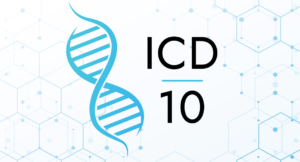ICD-10 Code
What is the ICD-10 code and why does it matter?
 How many people have been diagnosed with FSHD? What symptoms do they have and what kind of medical care are they getting? What medical complications are common? Do they also have higher or lower rates of other diseases? Answers to such questions will help guide how to improve the diagnosis and care of people with FSHD and are vital for companies thinking of developing treatments. These questions could be answered if we had a way to accurately identify people with FSHD in large databases of anonymous medical records. But this common-sense approach won’t work unless the medical records of people with FSHD can be found easily.
How many people have been diagnosed with FSHD? What symptoms do they have and what kind of medical care are they getting? What medical complications are common? Do they also have higher or lower rates of other diseases? Answers to such questions will help guide how to improve the diagnosis and care of people with FSHD and are vital for companies thinking of developing treatments. These questions could be answered if we had a way to accurately identify people with FSHD in large databases of anonymous medical records. But this common-sense approach won’t work unless the medical records of people with FSHD can be found easily.
This is where the ICD-10 code comes in. A unique code for FSHD was established in 2018 (thanks to the efforts of Dan Perez, co-founder of the FSHD Society). This code is in the International Classification of Diseases, Tenth Revision, Clinical Modification (ICD-10-CM), an international system used by physicians and other healthcare providers to classify and code all diagnoses, symptoms and procedures recorded in conjunction with hospital care. ICD-10 is the standard in the U.S. There is now also an ICD-11 that may be used in other countries.
For the U.S. the ICD-10 code for Facioscapulohumeral muscular dystrophy is G71.02.
Outside the U.S., check what system is the standard. The ICD-11 code for FSHD is 8C70.3.
The hard part
Creating unique codes for FSHD was the first hurdle. In theory, all healthcare providers treating a person with FSHD will add this code to the patient’s medical record. The reality: Most of the time this doesn’t happen. If you were diagnosed before 2018, your doctor may not think to add the new code to your record. You need to remind them to add it. And if they won’t, you have the right to review your medical records and ask in writing that your medical record be amended with the ICD-10 code.
Assigning an individual ICD-10 codes for FSHD will:
- facilitate the surveillance of FSHD;
- will allow more accurate estimates of the condition’s incidence, prevalence, and survivorship;
- allow for tracking of mortality and its causes, injuries, symptoms, and health visits;
- help to identify factors that influence health status and secondary conditions;
- be used to compare health information and outcomes across hospitals, regions, clinical settings, countries, and even across time in a given location;
- serve to track reimbursements;
- facilitate the evaluation of guidelines (implementation, adherence, and impact).
And – at a time when therapeutic treatments for the specific forms of muscular dystrophy are being approved for the first time in history – the ICD codes will enable health information systems to identify patients eligible for these therapies, evaluate the impact of those therapies over time, and ultimately improve quality and quantity of life for those living with FSHD.
